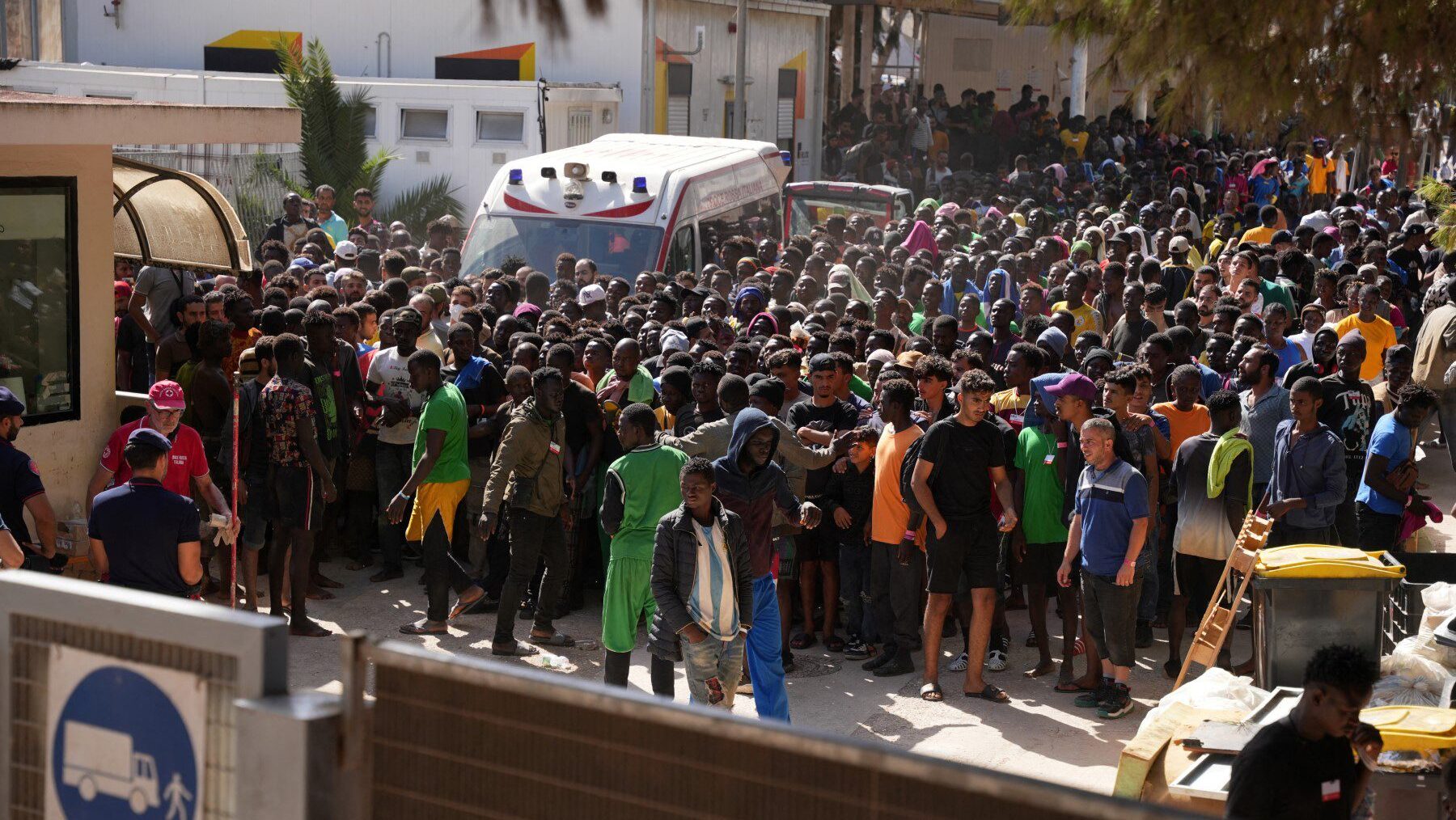
Overcrowded migrant hotspot on the island of Lampedusa, Italy.
Photo: Zakaria Abdelkafi / AFP
A group of European Union member states, led by Denmark and Czechia, will write a joint letter to Brussels demanding the Commission explore ways of externalizing asylum. Instead of housing asylum seekers on EU soil while assessing their claims, the signatories push for transporting them to facilities in third countries, similar to Italy’s bilateral agreement with Albania.
The draft letter was obtained by the Czech daily Hospodářské Noviny and published on Monday, May 6th. According to the site’s sources, Prague is unsatisfied with the EU’s new Migration and Asylum Pact, hence deciding together with Copenhagen to put together a coalition of member states to lobby for fundamental changes in how asylum applications are dealt with in the case of migrants arriving by sea.
“It’s a path to opening what was previously unthinkable but increasingly necessary,” a high-ranking source working on the project told the Czech newspaper.
Currently, most migrants who undertake the dangerous journey through the Mediterranean in smuggling vessels are rescued by the coast guard or NGOs, and then taken to the nearest EU country. Migrants are then supposed to wait in reception facilities until their asylum claims have been assessed, but since the majority is eventually deemed ineligible and scheduled for deportation, they rarely wait around and instead simply vanish into the borderless Schengen zone.
That’s what the signatories are asking the EU to change now, following the example of Rome’s bilateral agreement with Tirana. The Italian-Albanian deal allows Rome to house up to 36,000 asylum seekers while assessing their claims in the Balkan country instead of on EU soil, which means that rejected applicants will have little chance of escaping deportation.
Adapting such a system into an EU-wide standard procedure would not be easy and would require a lot more agreements with friendly third countries, but it may be the only way to effectively manage the EU’s external borders.
According to the plan outlined in the draft, the migrants picked up on the Mediterranean should not be even allowed to set foot on EU shores but taken to the third countries immediately, where “a permanent solution could be found for them,” meaning either granting asylum and entry to the EU or deportation back to their country of origin or other designated states, like Rwanda.
Furthermore, the letter also asks for the transfer of those migrants who are already in the EU and have been refused asylum, suggesting that they should wait until the end of their deportation procedures in similar facilities outside of the EU as well.
The full list of signatories has not been made public yet, but according to sources close to Euractiv, the approach outlined by the letter is supported by the “majority” of EU member states, including Italy, the Netherlands, and the Baltic countries.
“Outsourcing and relocation of asylum applications has a threefold function,” the Undersecretary of State at Italy’s Interior Ministry, Lega MP Nicola Molteni (ID) explained:
To fight more effectively the criminal organizations dedicated to human trafficking, as a deterrence tool against illegal departures, and as a means of relieving migratory pressure on the countries of first entry, such as Italy or Greece or Spain or Cyprus or Malta.
It is ironic that the debate about externalizing migration flared up just after the EU Parliament adopted the new Migration Pact, the EU’s flagship migration management legislation that’s been in the works for nearly a decade. EU member states in the Council are expected to put the final approval on the Pact on May 14th, but this latest push might indicate that there’s demand for last-minute revisions.
Of course, not every government supports the idea, just like the majority of leftist MEPs in the EU Parliament who have been calling every similar plan “unacceptable” from a human rights standpoint.
“Sending people to countries that have nothing in common with their country of origin, such as Albania or Rwanda, poses a moral and ethical problem,” stated French MEP Sacha Houlié (Renew), representing Emmanuel Macron’s Renaissance party.
Still, if the majority of the Council does stand by the proposal, there should be no reason why the Albania model shouldn’t be made an EU-wide standard. After all, each component of the Migration pact was also adopted by qualified majority voting only, without the possibility of any country vetoing it independently.
A key question is whether the European Commission is open to holding this discussion. Home Affairs Commissioner Ylva Johansson, Brussels’ migration policy chief, attended an international conference on illegal migration and people smuggling in Copenhagen on Monday, yet she didn’t even mention externalization in her speech, praising only the current form of the Pact and urging the EU to finalize and implement it.
